By FRED F. BLOIS
Halifax Chronicle Herald Thu. Jun 25
Every day hospital waste, feces, urine, household cleaners, vomit, blood, personal care products, prescription drugs, a vast array of chemicals, heavy metals and industrial waste are flushed into our sewer systems. The result, wastewater products, is a mixture of everything that we and industry flush down the drain.
This cocktail is piped from our homes, businesses and industries to sewage plants across the province. The water is filtered and discharged. Most of the solid waste, called sewage sludge, that remains is treated and turned into biosolids, which are promoted as a beneficial alternative to chemical fertilizers. These biosolids are then applied to the land that grows the food we eat.
Government officials and proponents insist the biosolids are not only tested, but also meet or exceed all the regulations surrounding the treatment and disposal of wastewater products. They also insist that biosolids are safe for application to agricultural land. There is, however, good reason to question the soundness of that opinion.
The regulations governing the treatment and disposal of wastewater products in Nova Scotia are based on the United States Environmental Protection Agency’s rules promulgated in 1993. Unfortunately, the risk assessment on which current rules are based is outdated and unreliable, as it fails to include many newly recognized chemicals of potential concern, including flame retardants, pharmaceuticals and personal care products such as shampoos and soaps".
Read more
June 25, 2009
Subscribe to:
Post Comments (Atom)



1 comment:
Thanks for posting this, Agrarian grrl: I have been fretting about the use of biosolids onto food crops since watching NFB documentary Crapshoot. (A concern for us in Victoria too, moving from dumping raw waste into the ocean to waste treatment.) I've heard this stuff is often sprayed on pastureland, the theory being that cattle will process out the nasties... but would be interested to know what remains in their meat, milk and manure.
Post a Comment